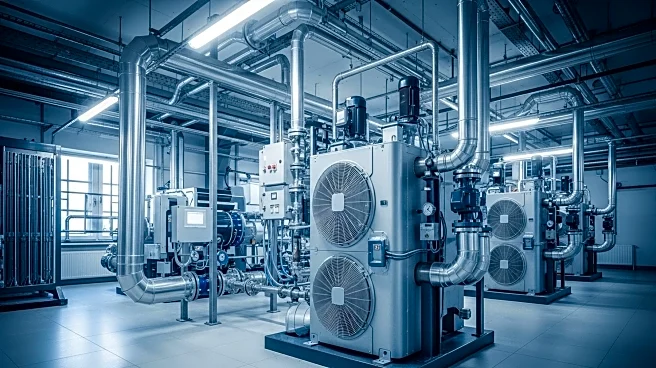What's Happening?
BASF has launched a project to construct a CO2-free steam heat pump at its Ludwigshafen site, aiming to decarbonize its production processes. The heat pump, with a thermal output of nearly 50 MW, will use green electricity to produce steam primarily for formic acid production, reducing annual greenhouse gas emissions by up to 98%. The project is supported by the German Federal Ministry for Economic Affairs and Energy, which will contribute up to €310 million as part of the Carbon Contracts for Difference funding program. The heat pump will utilize waste heat from cooling processes and is expected to be operational by mid-2027.
Why It's Important?
This initiative represents a significant step towards achieving climate neutrality in the chemical industry, aligning with global efforts to reduce carbon footprints. By electrifying steam production, BASF aims to offer products with lower environmental impact, enhancing its competitiveness in the green market. The project underscores the importance of sustainable technologies in industrial processes and highlights Germany's commitment to supporting decarbonization through substantial government funding. The reduction of 100,000 tons of CO2 annually demonstrates the potential impact of innovative energy solutions on environmental sustainability.
What's Next?
The construction of the heat pump is underway, with commissioning scheduled for mid-2027. BASF will continue to collaborate with project partner GIG Karasek to integrate the heat pump into its production environment. The success of this project may encourage further investments in green technologies across the chemical industry, potentially influencing policy decisions and funding allocations. As BASF progresses, it may explore additional opportunities to expand its use of sustainable technologies, contributing to broader decarbonization goals.
Beyond the Headlines
The project highlights the evolving role of industrial innovation in addressing climate change, emphasizing the need for collaboration between government and industry. The integration of green technologies into traditional production processes raises questions about the future of industrial operations and the potential for widespread adoption of similar solutions. As industries transition towards sustainability, ethical considerations regarding resource use and environmental impact will become increasingly relevant.









